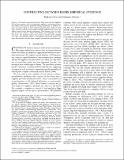Contracting between Firms: Empirical Evidence
Author(s)
Sautner, Zacharias; Iyer, Rajkamal Janakiraman
Downloadrest_a_00648.pdf (183.5Kb)
PUBLISHER_POLICY
Publisher Policy
Article is made available in accordance with the publisher's policy and may be subject to US copyright law. Please refer to the publisher's site for terms of use.
Terms of use
Metadata
Show full item recordAbstract
We analyze contracts between a large buyer and her suppliers. We find that contracts with critical product suppliers contain more clauses that address moral hazard, primarily through monitoring. If holdup concerns are larger, there are more contractual protections against it. Over time, contracts with the same supplier include additional provisions that address moral hazard through monitoring. This dynamic effect is strongest for service contracts, where observability and verifiability are initially lower. Our findings indicate that contracts become more complete over time and provide support to incomplete-contracting models that argue that contracts become more complete as contracting costs decrease.
Date issued
2018-03Department
Sloan School of ManagementJournal
Review of Economics and Statistics
Publisher
MIT Press
Citation
Iyer, Rajkamal, and Zacharias Sautner. “Contracting Between Firms: Empirical Evidence.” The Review of Economics and Statistics 100, 1 (November 2016): 92-104 © 2018 The President and Fellows of Harvard College and the Massachusetts Institute of Technology
Version: Final published version
ISSN
0034-6535
1530-9142